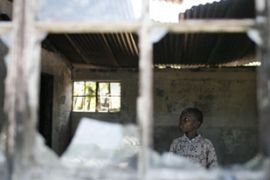Post-poll chaos to cost Kenya $1bn
Diplomatic efforts to arrange a meeting between leaders Odinga and Kibaki intensify.

Published On 8 Jan 2008
|
Your Views |
| Send us your views |
Attempts to bring the rival leaders together have so far failed, although Kibaki extended an invitation to Odinga on Monday for face-to-face talks.
Odinga had previously made any negotiations conditional on the president acknowledging that the December 27 vote count was rigged.
“He will not meet Kibaki for negotiations unless Kufuor is there,” said Lone.
Lone added that Odinga had not received a direct invitation from Kibaki to the talks, “so we can’t take it seriously.”
Political crisis
Diplomatic efforts to resolve the crisis have intensified in recent days, with a number of former African presidents in Nairobi following a mediation mission by Jendayi Frazer, the US Africa envoy.
| Related | ||||||
|
The former presidents – Tanzania’s Benjamin Mkapa, Mozambique’s Joachim Chissano, Botswana’s Katumile Masire and Zambia’s Kenneth Kaunda – travelled to western Kenya to assess the worst-hit area of post-poll violence ahead of a meeting with Kufuor.
“They will also meet former (Kenyan) president Daniel arap Moi to discuss ways of healing the country and fostering national reconciliation after the problem caused by the elections,” a foreign affairs spokesman said.
Newspapers reflected public relief at the increasing diplomatic activity, a day after Odinga cancelled nationwide protest rallies that many feared would reignite the clashes.
“It is indeed welcome if both sides are abandoning intransigent positions and edging towards the negotiating table,” the Daily Nation said in an editorial.
The Standard newspaper lamented the pictures of tribal clashes last week that prompted a UN-backed panel to compare the manner of the killings with ethnic cleansing and genocide.
“Apart from the temporary disruption, the ongoing crisis will cast a shadow over the economy for years to come,” the paper said.
Economic recovery
In an interview with the Reuters news agency, finance minister Kimunya said that despite the loss to the economy could be recovered within a year.
“I expect whether it’s within the next couple of months or within a year … that people will be able to recoup all that,” Kimunya said.
Three days after the election Kenya’s business community said the government was losing 2 billion shillings ($30.42m) worth of taxes daily due to the unrest.
But there has been a gradual return to normality in east Africa’s biggest economy, with currency and stock markets reporting higher volumes as trade resumed in earnest this week.
The weekly tea auction, which also serves Burundi, Uganda, Tanzania and Mozambique among others, resumed on Monday having been postponed for a week.
The central bank projects Kenya’s economy will grow by 8 per cent in 2008, compared with government forecasts of between 6.9 and 7.0 per cent for 2007.
“Depending on the rate of recovery,” Kimunya said, “Kenyans will eventually settle down and go on with their production. I expect probably our target will be met.”
According to the UN, 250,000 Kenyans have been displaced by the post-election violence and aid groups have warned of a potential health emergency in makeshift camps in schools, hospitals and churches in Rift Valley region of western Kenya, as well as Nairobi’s slums.
Source: News Agencies


